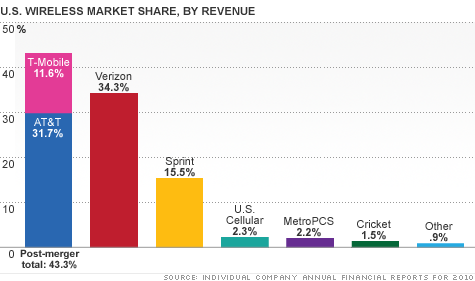Search News

NEW YORK (CNNMoney) -- The U.S. Department of Justice wants to roadblock AT&T's merger with T-Mobile. But does that mean the deal is off?
Welcome to uncharted territory. The kind of lawsuit that the Justice Department filed against AT&T is an extreme rarity.
The DOJ has probed 4.4% of all merger filings since 1990, according to Maurice Stucke, a law professor at the University of Tennessee and former U.S. Attorney for the DOJ's antitrust division. Most times, the agency investigates and then steps aside. The DOJ filed lawsuits against just 0.3% of mergers in the past 20 years -- and the vast majority of those were then settled outside of court.
"The fact alone that the DOJ wants to go through legal proceedings increases the uncertainty of the completion of the merger," said Michael Hausfeld, founder of Hausfeld LLP and lead U.S. prosecutor in several antitrust cases against Intel.
The DOJ filed its lawsuit before AT&T (T, Fortune 500) even had time to submit a response to the agency's latest request for information on the proposed deal.
That means a settlement isn't likely -- which is how several of the DOJ's recent merger challenges ended. The agency only approved Google's (GOOG, Fortune 500) acquisition of ITA and Comcast's (CMCSA, Fortune 500) purchase of NBCUniversal after the companies agreed to a set of provisions and restrictions.
"It probably means that there was nothing more that AT&T could have produced to persuade the DOJ that this deal wasn't anti-competitive," said Melissa Maxman, co-chair of the antitrust practice group at Cozen O'Connor. "It suggests that discussions had broken down, and there was no divestiture or behavioral remedy possible that would have ameliorated the potential wrong that the DOJ saw."
But before we start writing requiems for the deal, it's important to note that companies have coin-flip odds of successfully challenging the Justice Department in court.
The DOJ has won just under 50% of its court cases, according to Salil Mehra, an antitrust law professor at Temple University and former U.S. Attorney for the antitrust division of the DOJ.
A prominent example is the 2004 lawsuit the agency filed objecting to Oracle's purchase of PeopleSoft.
The DOJ maintained that PeopleSoft was one of just two direct competitors to Oracle in the human resource management software business. But Oracle (ORCL, Fortune 500) fought back hard, and seven months later, a judge ruled in Oracle's favor. The DOJ chose not to appeal, and the deal went through.
AT&T has 3 billion reasons to fight the lawsuit tooth and nail. If the merger is not approved, the company needs to pay a reverse termination fee of $3 billion to T-Mobile, and it has to forfeit several billion dollars more in wireless spectrum allotments.
Legal battles can be pricey. But even if AT&T goes the distance, an antitrust attorney with knowledge of the costs of such battles said AT&T's legal fees probably wouldn't top $10 million.
"AT&T has every incentive to litigate the hell out of this," said Danny Sokol, a professor at the University of Florida's Levin College of Law.
Still, that's not the only financial consideration.
Time isn't on AT&T's side. If AT&T loses its first-round court battle, an appeals process would drag on for months, delaying the deal and reducing its economic benefits.
AT&T wants to take advantage of T-Mobile's spectrum in order to quickly deploy its 4G network nationwide. The longer it waits, the more that advantage erodes.
Another bit of uncharted territory: The DOJ's lawsuit is the first test of the Obama administration's new merger guidelines. Announced a year ago, the new rules stipulate that a merger will be evaluated not only on how much it shifts market share, but also by its impact on rivals.
The proposed T-Mobile deal would increase AT&T's share of the wireless market from 32% to 43%, and reduce the number of nationwide carriers from four to three. Is that a huge change? It's debatable.
But T-Mobile is the last remaining national, low-cost carrier. Eliminating T-Mobile from the market would likely have a major impact on wireless prices for all consumers.
"The DOJ is saying that people won't be better off in terms of pricing and product innovation if the deal goes through," said Evan Stewart, partner in the antitrust practice at Zuckerman Spaeder. "This isn't wacky legal theory from the DOJ; this is right down the middle of the fairway."
Yet other antitrust experts look at the same DOJ filing and see it as saber-rattling.
"I think this is a bump in the road. The deal is still going to get done," said David Kaufman, partner in the antitrust practice at Duane Morris LLP. "The Obama administration feels a lot of pressure to show it's tough, but AT&T has too much at stake to let this fall through. They're going to get a deal done."
So: Will it go through or not?
No one knows. But either way, AT&T is going to have a lot more explaining to do. ![]()